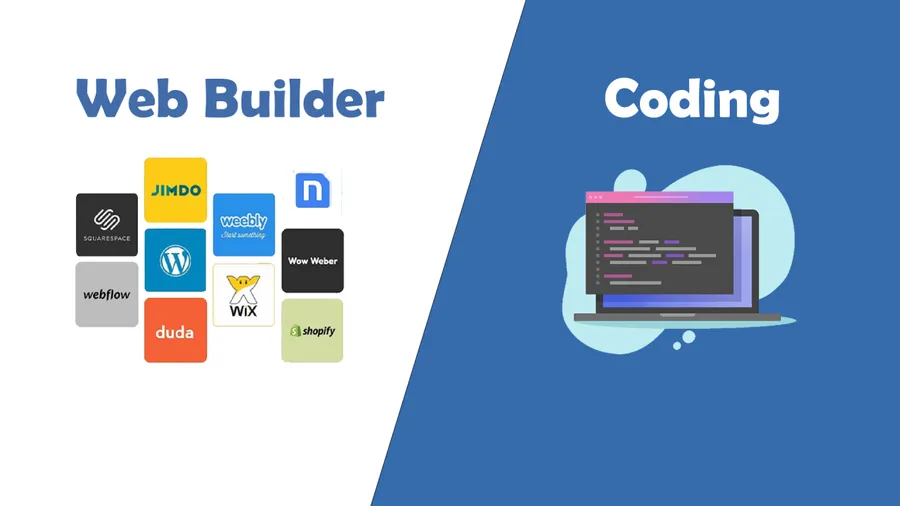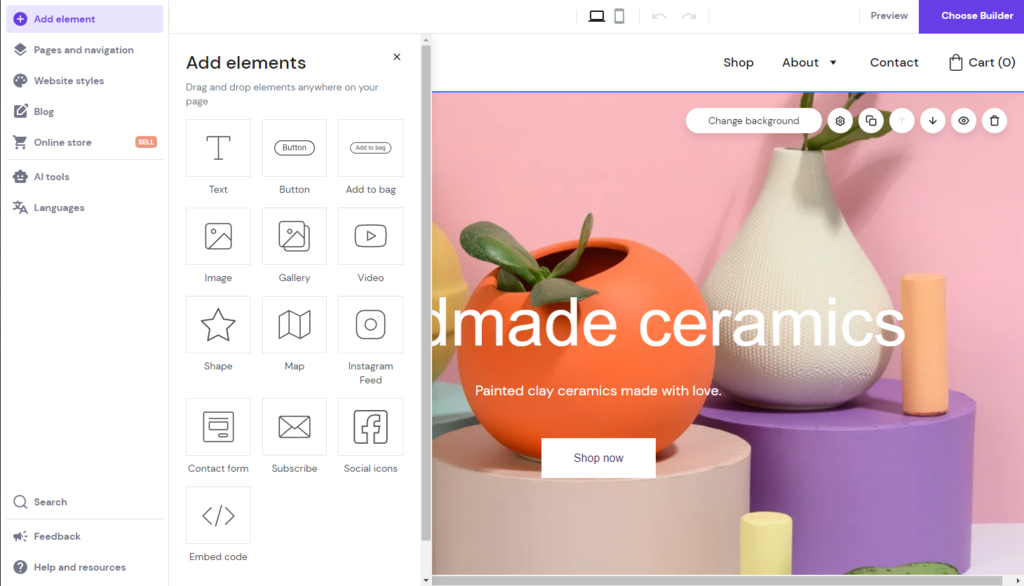Building a website is the first step in establishing an online presence, but the creation process can seem daunting. Should you use a website builder or learn to code? This question has fueled countless debates, and both methods offer distinct advantages and challenges.
In this blog, we’ll explore the differences between using website builder vs coding a website from scratch, comparing their ease of use, cost-effectiveness, flexibility, and maintenance requirements. Whether you’re a tech-savvy entrepreneur or a coding novice, we’ll guide you through decision-making, helping you choose the best approach for your unique needs.
Eduma – Education WordPress Theme
We provide an amazing WordPress theme with fast and responsive designs. Let’s find out!
Website Builder vs Coding: What Is It?
At its core, the decision between a website builder and coding boils down to a trade-off between simplicity and flexibility.
- Website Builder: Website builders are online platforms equipped with intuitive, visual interfaces and drag-and-drop functionalities. They empower individuals with little to no coding experience to swiftly assemble a functional website by selecting from a plethora of pre-designed templates and modules.
- Coding: Coding, or hand-coding a website, entails crafting the website’s code from the ground up using programming languages like HTML, CSS, and JavaScript. This grants developers unparalleled control over every facet of the website’s design and functionality but demands proficiency in these languages.
Website Builder vs Coding: Pros and Cons

Let’s delve into the advantages and disadvantages the website builder vs coding based on insights gleaned from the internet and the information you provided:
Website Builder: Pros
Website builders excel in speed, user-friendliness, and affordability, making them ideal for beginners and simple website projects.
- Time-saving: Website builders significantly accelerate the development process, often enabling users to publish a website within hours or days. This efficiency stems from pre-designed templates, streamlined content management systems, and integrated hosting and domain solutions.
- Beginner-friendly: With user-friendly interfaces and minimal technical hurdles, website builders are ideal for novices and individuals without coding expertise. The visual nature of these platforms eliminates the need for intricate coding knowledge.
- Cost-effective: Website builders generally offer bundled packages that encompass hosting, domain registration, and essential features like marketing and SEO tools, often at competitive price points.
- Easy Update and Maintenance: Website builders facilitate effortless content updates and design modifications through intuitive visual editors. Moreover, the platform provider often handles server maintenance and security patches, relieving users of those technical burdens.
Website Builder: Cons
Limitations in design flexibility, potential performance constraints, and migration restrictions are among the drawbacks of website builders.
- Design Limitations: Website builders, while offering diverse templates, inherently impose limitations on design customization. Users may find themselves constrained by the available layouts and modules, impeding the realization of highly unique or intricate design visions.
- Performance: Websites crafted using certain website builders might exhibit slower loading times due to back-end complexities and template bloat. Additionally, the reliance on shared hosting environments can occasionally result in performance constraints, especially during traffic spikes.
- Flexibility: Website builders typically confine users to the features and functionalities provided within the platform. While these suffice for many websites, the lack of extensive customization and third-party integrations can be a hindrance for those seeking bespoke functionalities or specialized applications.
- Migration Restriction: Some website builders impose restrictions on website migration due to proprietary infrastructure or platform dependencies. Migrating to a different host or platform may necessitate recreating the website from scratch, potentially resulting in a time-consuming and disruptive process.
- Security: Websites constructed on a shared platform might be more susceptible to security vulnerabilities if the underlying platform’s codebase encounters exploits. However, it’s important to note that security breaches are more frequently attributable to human error than inherent platform flaws.
Website Builder: Best For
Website builders cater to beginners, those seeking simplicity, and projects requiring basic functionalities.
- Beginners and learners: Website builders offer a welcoming entry point for individuals embarking on their website creation journey, obviating the need for coding skills and streamlining the process.
- Simple Websites: Projects like personal blogs, portfolio websites, small business websites, or basic online stores can readily thrive with the functionalities provided by website builders. The bundled marketing and SEO tools further enhance their appeal.
Coding: Pros
Coding offers unparalleled customization, optimal performance, seamless integrations, and easy migration, making it suitable for complex and ambitious web projects.
- Performance: Hand-coded websites, when meticulously optimized, often outperform websites built with builders in terms of loading speed and overall performance. This is achieved by minimizing code bloat, streamlining server requests, and fine-tuning every aspect for optimal efficiency.
- Customization: Coding empowers developers to meticulously craft every pixel and interaction on their website, translating their creative vision into reality without design constraints. Custom animations, interactive elements, and unique functionalities are all readily achievable through coding.
- Integrations: Websites developed through coding seamlessly integrate with a wide spectrum of third-party tools and APIs, unlocking limitless possibilities for extending functionality and connecting to external services.
- Easy Migration: Hand-coded websites can be readily migrated to different hosting providers due to their independence from proprietary platforms. This flexibility ensures that your website remains portable and adaptable.
- Security: Custom codebases, when diligently secured, can be inherently more resilient to exploits, as they lack the predictability often associated with shared platform code. However, robust security practices remain essential regardless of the development method.
Coding: Cons
The time-consuming nature, higher costs, and technical expertise required are the primary challenges associated with coding a website.
- Time-consuming: Crafting a website through coding is a significantly more time-intensive endeavor than utilizing a builder. The process encompasses planning, coding, testing, and debugging, potentially extending the development timeline to weeks or even months.
- High Cost: The complexity of hand-coding a website often necessitates hiring a skilled web developer, leading to higher upfront costs. Additionally, acquiring a domain name and web hosting separately adds to the overall expenditure.
- Higher Difficulty: Coding a functional website demands proficiency in multiple programming languages, including HTML, CSS, and JavaScript, with additional languages like Python or PHP often required for more advanced functionalities.
- Hard Maintenance: Introducing updates, modifications, or new features to a hand-coded website necessitates manual code alterations. This can become intricate and time-consuming, especially for websites with extensive functionalities or complex code structures.
Coding: Best For
Coding is ideal for experienced developers, complex projects demanding extensive customization, and performance-critical websites.
- Experienced Developers: Coding provides professional web developers with complete control and creative freedom to bring their ambitious web visions to fruition.
- Complex and Highly Customized Websites: Websites necessitating intricate features, bespoke functionalities, or seamless integrations with numerous external services are prime candidates for hand-coding.
- Performance-Critical Websites: Websites that prioritize lightning-fast loading times, impeccable performance, and meticulous optimization thrive when hand-coded.
Website Builder vs Coding: Key Differences
Website Builders: A Visual Approach to Creation
A website builder empowers you to create a website without needing to write any code. This user-friendly platform provides a visual editor where elements can be effortlessly dragged and dropped, resulting in a dynamic and interactive website.

Many website builders go the extra mile by offering pre-designed templates and a library of royalty-free images and graphics to expedite the development process. Some innovative platforms, like Hostinger, even introduce AI-powered website generation for unparalleled convenience. However, it’s worth noting that customization options within website builders may be somewhat limited.
Coding: The Art of Flexibility and Control
On the other hand, building a website entirely from scratch through coding offers a heightened degree of flexibility. While every element of your site becomes customizable, the trade-off is the significant time investment required. Each component necessitates meticulous coding using HTML and CSS.
Crafting a single page might involve composing thousands of lines of code, potentially consuming hours of dedicated effort. Manual coding also introduces a greater risk of errors, as even a seemingly insignificant typo can lead to unexpected outcomes.

Furthermore, relying solely on HTML and CSS limits the website to static content with restricted functionality. To elevate the site with dynamic features and interactivity, a deeper understanding of JavaScript and a server-side language like PHP is crucial.
Website Builder vs Coding: Side-by-Side Comparison
Let’s delve into a more detailed comparison between a website builder and coding:
| Differentiator | Manual Coding | Website Builder |
| Technical and Coding Knowledge | High | Little to none |
| Learning Curve | Steep, challenging for beginners | User-friendly, intuitive interface |
| Time to Build | Several months (on average) | A few hours or days |
| Customization and Flexibility | Extensive, direct manipulation of source code | Limited to platform features |
| Cost | Typically higher due to development resources | Budget-friendly, all-inclusive plans |
| Maintenance | More complex, requires coding skills | Simple, visual updates within the platform |
Final Thoughts: Website Builder vs Coding
The choice between a website builder and coding hinges on factors such as your technical proficiency, desired level of control, budget, and the complexity of your website vision. Website builders offer an attractive proposition if you seek a quick and affordable solution with moderate customization needs. However, for those prioritizing maximum flexibility, unique features, and complete creative control, embracing the art of coding might be the ideal path.
Read more: What Is eCommerce Email Marketing? Top 6 Best Platforms To Try
Contact US | ThimPress:
Website: https://thimpress.com/
Fanpage: https://www.facebook.com/ThimPress
YouTube: https://www.youtube.com/c/ThimPressDesign
Twitter (X): https://x.com/thimpress_com



